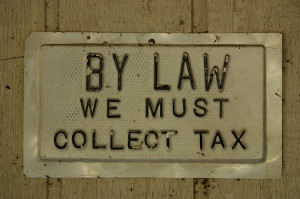How to Avoid Panic If You Get Audited by Mary’n Hallock
 Taxes freak out everybody and being audited is the ultimate freak-out. However, Mary’n Hallock, formerly of Sane Spaces, publisher of The E-Newsletter of The Painless Paper Cut, was audited and lived to tell the tale! I asked her if I could share her tips with subscribers, and she agreed. So, here are her tips:
Taxes freak out everybody and being audited is the ultimate freak-out. However, Mary’n Hallock, formerly of Sane Spaces, publisher of The E-Newsletter of The Painless Paper Cut, was audited and lived to tell the tale! I asked her if I could share her tips with subscribers, and she agreed. So, here are her tips:
From Mary’n: Yes, I really did get audited this month. Fortunately, it turned out great. In less than an hour, my friendly IRS “investigator” stopped the audit and said, “Well, I am going to recommend that we accept your return as filed because you were so clear in your responses, and you were so organized, that I tend to believe your return is correct.”
How about that? She really said she believed me because I was organized! (Admittedly, it may have just been that the person before me came out carrying grocery bags of receipts, but I prefer to believe it truly was due to the efforts I put into organization.)
So here’s how you can avoid the terror that usually accompanies the very thought of an audit. Note that these tips are not in order of importance – they all are important!
-
Organize the heck out of your financial paperwork – especially if you tend to want to avoid dealing with it. Most of us avoid things we detest, naturally enough. But this can cause more headaches, not fewer! So, work very hard to get yourself in some good habits around your financial papers (especially those tax related things).
-
Save your business (or personal) tax related receipts in folders either by vendor or tax category. This may depend on how your accountant or bookkeeper wants you to do it. When I started my business a few years ago, my bookkeeper asked me to store my receipts by month, because this made it very easy for her to do her work. However, in being audited, I was forced to re-file the whole year’s receipts so I could easily show receipts for advertising, printing, office supplies etc. From now on, I am filing by month until the bookkeeper is through with the month’s work and then re-filing by category (or account). It may be a bit more work but it will be worth the effort if I ever get a tap from the IRS again! Oh, and yes, you do need receipts — just your cancelled checks are not usually sufficient for the IRS.
-
Organize your receipts. Most everyone I work with starts with a mess of business receipts on their desk (or on the floor or in their purse or wallet). Have one place you put receipts – a pocket in your purse can be reserved just for these or keep a plastic envelope in your car. Then be sure to have one place (a box or folder) in your office to keep them until they are filed. Just as important is to write on the receipt even before you leave the store what the item is – office supplies etc. If it is a meal, record on the receipt who you had a meeting with and the purpose (e.g. John Brown, software sales meeting).
-
Schedule time to keep up. Maintenance is the key to any organizing system. At least once a month, take an hour or so to put your receipts in the right folders. Set up your folders now for the next year!
-
Don’t take “shady” deductions. If you’re tempted to write off your groceries or the like, re-think that. I know now from personal experience that the IRS folks are pretty good at ferreting out any subterfuge. Stay above board and it will pay off in peace of mind.
-
Keep close track of your income. If you don’t issue invoices or keep records of every sale, start doing it. The IRS is most interested in what you brought in, including bartering.
-
If you are collecting sales tax, keep that system clean also. My accountant tells me that sales tax audits make IRS investigations seem gentle and kindly.
-
Use an accounting software, such as Quickbooks. Trust me, being able to print out a report that tells you exactly the information you need to know is very worth the trouble to buy it and learn it. (Or find a good bookkeeper.)
-
If you drive a lot for your business, use a mileage log. I have a single piece of paper for each month on a small clipboard in my car on which I put down the date and who I saw, worked with or events I attended and I record the beginning mileage, the end mileage and the total for each trip. This brief note each day can save many, many dollars on your taxes each year.
-
Form good habits. I completely understand that habits are difficult to instill or change but it can be done. The primary reason people don’t develop a behavior into a habit is simple – they just forget to do it! My mileage log took six months to turn into a habit that is so integrated that it just feels wrong not to fill it out each trip! I had to persist, persist, persist, to get myself to remember to do it. I finally figured out that if I put it on the steering wheel every night, I would remember to do it. So, connect your new habit to an old one (like taking a new pill when you brush your teeth).
© Mary’n Hallock http://www.sayyess.com/MarynHallock.php
 If you have files, notebooks, papers, boxes, envelopes, albums, and other “stuff” all over your office or home and you are tired of wishing you had a good filing system, you’re in need of the Paper Tiger System to File & Find Your Stuff.
If you have files, notebooks, papers, boxes, envelopes, albums, and other “stuff” all over your office or home and you are tired of wishing you had a good filing system, you’re in need of the Paper Tiger System to File & Find Your Stuff.
I have used this software for over 13 years and it helps me file and find all kinds of things – paper and beyond. Access this class today to get organized and reduce your stress.



